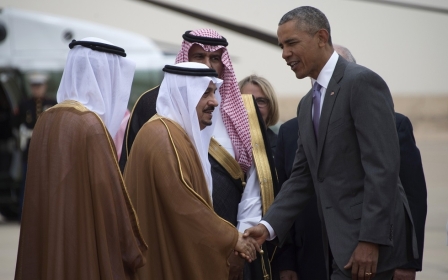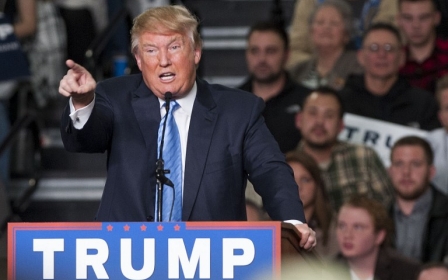US Senate passes bill against alleged Saudi sponsors of terrorism

The US Senate passed a bill on Tuesday that would allow American families of victims of attacks committed on US soil to sue foreign states deemed responsible, either directly or by aiding the culprits and their organisations.
Sponsored by US Senators John Cornyn, a Texas Republican, and Charles Schumer, a New York Democrat, the “Justice Against Sponsors of Terrorism Act” or JASTA – introduced back in September - does not mention any one government by name, but it has been widely interpreted as a reference to Saudi Arabia and its alleged involvement in the attacks of 11 September 2001. The attacks killed more than 3,000 people, including first responders and passengers aboard the aircrafts that crashed into the World Trade Center towers, the Pentagon and a field in Pennsylvania.
The National Commission on Terrorist Attacks Upon the United States, also known as the 9/11 Commission, created by then-president George W Bush to investigate the circumstances surrounding the attacks, concluded that there was "no evidence" that the Saudi government or individual Saudi officials funded al-Qaeda.
“Saudi Arabia has long been considered the primary source of al-Qaeda funding, but we have found no evidence that the Saudi government as an institution or senior Saudi officials individually funded the organisation,” the report said.
However, it added, “This conclusion does not exclude the likelihood that charities with significant Saudi government sponsorship diverted funds to al-Qaeda.”
It also noted: “Saudi Arabia has been a problematic ally in combating Islamic extremism.”
Twenty-eight pages of the commission’s report remain classified and critics say that those pages could mention state-supported sources for the attacks.
John Lehman, a member of the 9/11 Commission, said last week that the commission looked into at least five members of the Saudi government, including members of the Ministry of Islamic Affairs who might have offered assistance to the hijackers of the airplanes that flew into the Twin Towers. Former Senator Bob Graham, who produced the “28 pages,” says that other branches of the Saudi government were involved.
During a visit to Washington in March, Saudi Foreign Minister Adel al-Jubeir told lawmakers that if Congress passed JASTA, Saudi Arabia would have to sell off up to $750bn in US Treasury securities, lest they be frozen by American courts.
The potential economic fallout is not a deterrent to the bill’s sponsors, however, or families of the victims of 9/11, who continue to call for Saudi Arabia’s alleged role to be exposed, and for the nation to be held accountable.
“The United States needs to use every tool available to stop the financing of terrorism. Victims and families who have lost loved ones in terror attacks deserve the opportunity to seek justice,” Cornyn said.
“JASTA is a long-overdue fix - a responsible, balanced fix - to a law that has extended too large a shield to foreign actors who finance and enable terrorism on a massive scale,” said Senator Charles Schumer in a statement.
“The victims of 9/11 and other terrorist attacks have suffered such pain and heartache, but they should not be denied justice and so, I will fight hard in Congress until the House passes this bill and it is signed into law.”
The White House has been vocal in its opposition of the bill, and during President Barack Obama’s trip to Saudi Arabia in April, White House press secretary Josh Earnest and deputy national security advisor Ben Rhodes (best known recently for his controversial remarks about the Iran nuclear deal) held a joint press briefing, in which they reiterated the president’s position against the bill.
“On 9/11, on the legislation, I mean, I think it’s just important to reiterate that our opposition to that legislation is not rooted in the Saudi bilateral relationship, it’s rooted in our concern that if you set a precedent for removing sovereign immunity, you open up the United States to lawsuits and litigation and processes on a whole range of issues around the world,” Rhodes told journalists.
“And so we simply believe it’s not the way to address those concerns,” he added.
“If we are opening up the possibility that individuals in the United States can routinely start suing other governments,” Obama told CNN more recently, “then we are also opening up the possibility that individuals in other countries can routinely sue the United States.”
This becomes especially problematic if families of victims killed in drone strikes or other military engagements were able to sue the US government for wrongful deaths. Consequently, it is unlikely this bill will ever be passed into law.
Meanwhile, on the day of the hearing, the US Treasury Department revealed Saudi Arabia’s holdings of US debt.
Bloomberg News reported that Saudi Arabia had $116.8 bn of US debt in March, which makes the country among the leading holders of US debt. However, that number pales in comparison with the amount of US debt owned by China and Japan, which totals $1.3 trillion and $1.1 trillion, respectively.
The Treasury Department has kept debt holdings secret for over 40 years.
New MEE newsletter: Jerusalem Dispatch
Sign up to get the latest insights and analysis on Israel-Palestine, alongside Turkey Unpacked and other MEE newsletters
Middle East Eye delivers independent and unrivalled coverage and analysis of the Middle East, North Africa and beyond. To learn more about republishing this content and the associated fees, please fill out this form. More about MEE can be found here.




